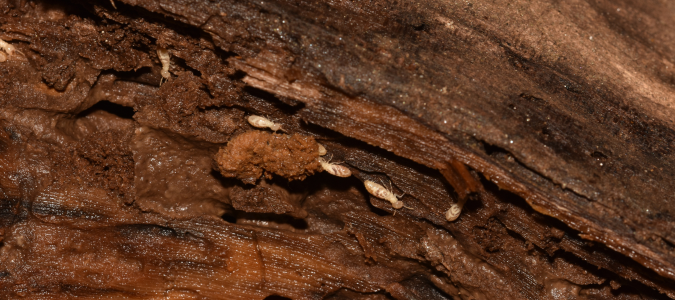Innovative Termite Control Technologies for Malaysian Properties

Strong 8k brings an ultra-HD IPTV experience to your living room and your pocket.
Termites are a persistent and costly problem for property owners in Malaysia due to the country’s tropical climate, which provides an ideal environment for these destructive pests. Traditional methods of termite control, such as chemical soil treatments and baiting systems, have been used for years. However, advancements in technology have led to the development of innovative termite control solutions that are more effective, environmentally friendly, and sustainable. This article explores the latest termite control technologies that are revolutionizing pest management in Malaysia.
1. Smart Termite Baiting Systems
Traditional baiting systems have been a staple in termite control, but recent innovations have improved their effectiveness. Smart termite baiting systems incorporate digital monitoring, allowing for real-time tracking of termite activity. These systems use sensors and IoT (Internet of Things) technology to detect termite presence and send alerts to pest control professionals. This enables a rapid response and reduces the need for excessive pesticide use, making it a more eco-friendly approach.
2. Electromagnetic and Ultrasonic Termite Repellents
Electromagnetic and ultrasonic termite repellent devices are gaining popularity as a non-toxic alternative to traditional pest control methods. These devices emit electromagnetic waves or ultrasonic frequencies that disrupt termite communication and navigation, deterring them from infesting properties. While studies on their long-term effectiveness are still ongoing, many property owners in Malaysia are adopting this technology as a supplementary preventive measure.
3. Biological Termite Control Using Beneficial Microorganisms
Biological termite control leverages natural predators and microbial agents to target termite colonies. One such innovative approach is the use of fungi-based bio-pesticides, such as Metarhizium anisopliae, which infect and kill termites upon contact. Unlike chemical treatments, these bio-pesticides are environmentally safe and do not harm non-target organisms. Research in Malaysia has shown promising results in using beneficial microorganisms for termite management, particularly in urban and agricultural settings.
4. AI-Powered Termite Detection Systems
Artificial Intelligence (AI) is revolutionizing termite detection and control. AI-powered termite detection systems use infrared cameras, motion sensors, and machine learning algorithms to identify termite activity with high precision. These systems can differentiate between harmless wood-boring insects and destructive termites, reducing false alarms and optimizing pest control strategies. Some Malaysian pest control companies have already started incorporating AI-powered detection tools into their services to improve efficiency and accuracy.
5. Termite-Resistant Building Materials
Another innovative approach to termite control is the use of termite-resistant building materials. Engineered wood treated with borate-based compounds, fiber cement boards, and composite materials infused with anti-termite properties are becoming increasingly popular in Malaysia. These materials prevent termites from infesting structures, reducing long-term maintenance costs and providing a sustainable solution for homeowners and developers.
6. Automated Chemical Barriers with Precision Application
While chemical barriers remain a widely used termite control method, advancements in automated application techniques have made them more effective and less invasive. Modern chemical barrier systems use precision injection technology to apply termiticides directly into the soil or structural components, ensuring uniform distribution while minimizing environmental impact. These automated systems also integrate with digital monitoring tools to track treatment effectiveness over time.
7. Drone Technology for Termite Inspection
Drones equipped with high-resolution cameras and thermal imaging sensors are transforming the way termite inspections are conducted in Malaysia. These drones can access hard-to-reach areas such as rooftops, attics, and large commercial structures, providing detailed aerial assessments of termite activity. By using drone technology, pest control professionals can identify termite infestations more accurately and plan targeted treatments without causing unnecessary structural damage.
8. Nanotechnology-Based Termiticides
Nanotechnology is making its way into the pest control industry, offering more efficient and environmentally friendly termiticides. Nanoparticles enhance the absorption and dispersion of termiticides, making them more potent against termite colonies while reducing overall chemical usage. Researchers in Malaysia are exploring the potential of nano-formulated insecticides to improve termite control in urban and rural areas.
9. Solar-Powered Termite Monitoring Stations
Eco-conscious property owners in Malaysia are increasingly adopting solar-powered termite monitoring stations. These stations use solar energy to power sensors that detect termite activity in real-time. Data collected from these sensors is transmitted to cloud-based platforms, allowing pest control companies to analyze trends and implement proactive termite management strategies. This technology not only reduces reliance on chemical treatments but also contributes to sustainable pest control practices.
Conclusion
The advancement of termite control technologies in Malaysia is transforming the way property owners and pest management professionals tackle termite infestations. From AI-powered detection systems and drone inspections to nanotechnology-based termiticides and eco-friendly baiting solutions, these innovations provide effective, sustainable, and environmentally friendly alternatives to traditional termite control methods. As these technologies continue to evolve, the future of termite management in Malaysia looks promising, ensuring better protection for properties while minimizing the ecological footprint of pest control interventions.
Note: IndiBlogHub features both user-submitted and editorial content. We do not verify third-party contributions. Read our Disclaimer and Privacy Policyfor details.


